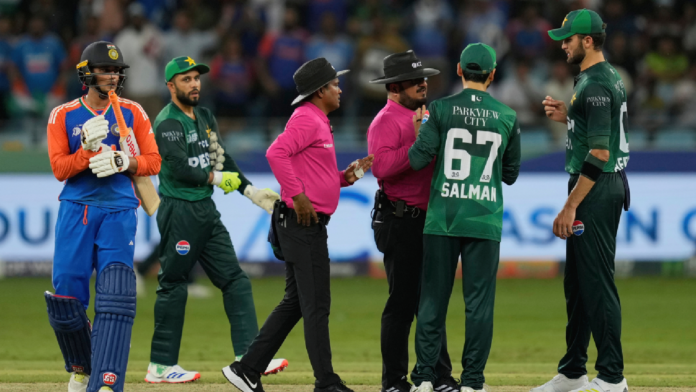The palpable “unquiet tension” gripping the inner sanctums of the Dubai International Stadium confirms one inescapable truth: this is not just another game. As groundsmen meticulously trim the outfield and security combs the barricades, the venue prepares for a final defined by rancour, political undertones, and the pursuit of ultimate victory over a bitter rival. While this Asia Cup has been described by some as a “low-quality drag,” the final between India and Pakistan elevates the fixture into the only match that truly matters, promising a capacity crowd despite the 350-dirham ticket price.
India: The Uneasy Favourites
India steps into the final as the “well-grooved, state-of-the-art favourites,” having dominated the tournament with an impressive eight-match unbeaten streak and comfortable wins against Pakistan in their two previous meetings. However, the analysis reveals that their “supposedly impenetrable armour” has begun to creak.
The team has shown an uncomfortable over-dependence on Abhishek Sharma’s blistering starts. A singular failure from the opener could expose the fragile nature of their batting. Further compounding this, captain Suryakumar Yadav, arguably India’s finest T20 exponent, is currently experiencing a fallow spell.
On the bowling front, concerns surround the form of the world-class pacer Jasprit Bumrah, who recently recorded his third-worst-ever T20I figures against Pakistan. Most critically, the balance of the entire side hinges on the fitness of all-rounder Hardik Pandya, who was seen limping in the last match. Should he fail his fitness test, India’s depth would be severely compromised, leaving them reliant on personnel like Arshdeep Singh, whose economy has recently bled runs per over.
Pakistan: The Resurgent Underdogs
While regarded as a “rebuilding bunch,” Pakistan has found a compelling spirit of defiance as the tournament has progressed, fighting back from adversity against both Bangladesh and Sri Lanka. This resurgence makes the rivalry far more equal than captain Yadav might concede.
Key figures have rediscovered their bite just in time for the final:
- Shaheen Shah Afridi: The totemic seamer has regained some of his old snap, setting the stage for a mouth-watering head-to-head duel with India’s opener, Abhishek Sharma.
- Haris Rauf: No longer a “tormented figure,” Rauf exhibited his ferocity against Sri Lanka.
- Fakhar Zaman: The batsman carries the historical weight of having tormented India in high-stakes matches, notably the 2017 Champions Trophy final.
Block by block, the pieces are falling into place for Pakistan. While their batting remains a “sum of its collective parts,” the team exudes the palpable vibe of a resurgent side.
The Power of History and Pressure
Tournament finals often exist as an “isolated beast,” blurring the disparity in quality. Pressure kicks in, and the underdog can successfully harness a siege mentality to over-perform.
History, crucially, favors Pakistan’s glorious mystery of winning tournaments by stealth. Their upsets—from the rain-aided 1992 World Cup triumph to the unexpected 2017 Champions Trophy win—serve as a potent reminder that form counts for precious little. The 2017 final, settled by a match-winning hundred from Fakhar Zaman after a Jasprit Bumrah no-ball reprieve, exemplifies their capacity for dramatic victory.
India’s own bowling coach, Morne Morkel, conceded that the team is “yet to play the complete game.” This vulnerability, coupled with Pakistan’s knack for the spectacular, makes a Pakistan victory a triumph for the underdog, even with India carrying an inescapable air of destiny.
Source: Indian Express








